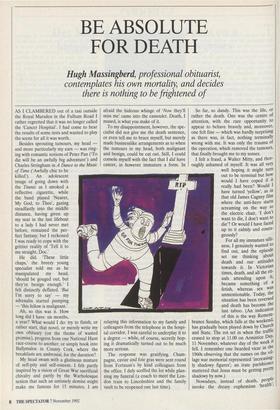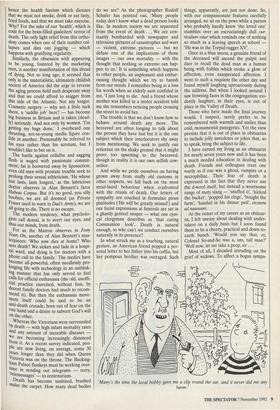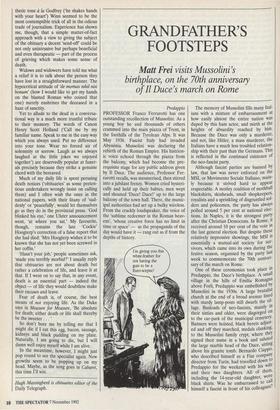BE ABSOLUTE FOR DEATH
Hugh Massingberd, professional obituarist,
contemplates his own mortality, and decides there is nothing to be frightened of
AS 1 CLAMBERED out of a taxi outside the Royal Marsden in the Fulham Road I rather regretted that it was no longer called the 'Cancer Hospital'. I had come to hear the results of some tests and wanted to play the scene for all it was worth.
Besides sprouting tumours, my head — and more particularly my ears — was ring- ing with romantic notions of Peter Pan (`To die will be an awfully big adventure') and Charles Stringham in A Dance to the Music of Time (Awfully chic to be killed'). An adolescent image of going down with the Titanic as I smoked a reflective cigarette, while the band played 'Nearer, My God, to Thee', gazing steadfastly into the middle distance, having given up my seat in the last lifeboat to a lady I had never met before, remained the per- fect fantasy; but I reckoned I was ready to cope with the grittier reality of 'Tell it to me straight, Doc.'
He did. 'These little chaps,' the breezy young specialist told me as he manipulated my head, 'should be gouged out, but they're benign enough.' I felt distinctly deflated. Rut I'm sorry to say' — my adrenalin started pumping — 'this fellow is malignant.'
Ah, so this was it. How long did I have: six months, a year? What would I do: try to finish, or rather start, that novel, or merely write my own obituary (on the theme of wasted promise), progress from one National Hunt race-course to another; or simply book into Ballymaloe in County Cork, where the breakfasts are ambrosial, for the duration?
My head swam with a glutinous mixture of self-pity and self-esteem. I felt partly inspired by a vision of Great War sacrificial chivalry and partly by the Warholesque notion that such an untimely demise might make me famous for 15 minutes. I am afraid the hideous whinge of Wow they'll miss me' came into the cassoulet. Death, I mused, is what you make of it.
To my disappointment, however, the spe- cialist did not give me the death sentence, or even tell me to brace myself, but merely made businesslike arrangements as to when the tumours in my head, both malignant and benign, could be cut out. Still, I could console myself with the fact that I did have cancer, in however immature a form. In relaying this information to my family and colleagues from the telephone in the hospi- tal corridor, I was careful to underplay it to a degree — while, of course, secretly hop- ing it dramatically turned out to be much more serious.
The response was gratifying. Cham- pagne, caviar and foie gras were sent round from Fortnum's by kind colleagues from the office. I duly scoffed the lot while plan- ning my funeral (a coach to meet the Lon- don train to Lincolnshire and the family vault to be reopened one last time). So far, so dandy. This was the life, or rather the death. One was the centre of attention, with the rare opportunity to appear to behave bravely and, moreover, one felt fine — which was hardly surprising as there was, in fact, nothing terminally wrong with me. It was only the trauma of the operation, which removed the tumours, that finally brought me to my senses.
I felt a fraud, a Walter Mitty, and thor- oughly ashamed of myself. It was all very well hoping it might turn out to be terminal but how would I have coped if it really had been? Would I have turned 'yellow', as in that old James Cagney film where the anti-hero starts screaming on the way to the electric chair, 'I don't want to die, I don't want to die'? Or would I have faced up to it calmly and coura- geously?
Nowadays, instead of death, people invoke the dreary euphemism 'healthy hence the health fascism which dictates that we must not smoke, drink or eat fatty, fried foods, and that we must take exercise. Why? For the sake of our 'health', which is code for the bran-filled gauleiters' terror of death. The only light relief from this ortho- doxy comes when one of their number col- lapses and dies out jogging — which happens with gratifying regularity.
Similarly, the obsession with appearing to be young, fostered by the marketing men, is another manifestation of this dread of dying. Not so long ago, it seemed that only in the materialistic, ultimately childish society of America did the urge to reverse the aging process hold such desperate sway and that we could afford to snigger from this side of the Atlantic. Not any longer. Cosmetic surgery — why not a little tuck there, a 'saddle job' here? — has become big business in Britain and is taken (dead- ly) seriously. And not only by women. 'I'm getting my bags done,' I overheard one thrusting, not-so-young media figure con- fide in another. Presumably he referred to his eyes rather than his scrotum, but I wouldn't like to bet on it.
The battle against cellulite and sagging flesh is waged with passionate commit- ment; fat is hoovered away by liposuction; even old men with prostate trouble seek to Prolong their sexual athleticism. 'He whose lust lasts, lasts longest,' as the lubricious doctor observes in Alan Bennett's farce Habeas Corpus. But it's no good, you silly boobies, we are all doomed (as Private Fraser used to warn in Dad's Army), we are all going to die. There is no escape.
The modern tendency, what psycholo- gists call denial, is to avert our eyes, and thus our minds, from death.
For as the Matron observes in Forty Years On, another of Alan Bennett's mas- terpieces: 'Who now dies at home? Who sees death? We sicken and fade in a hospi- tal ward, and dying is for doctors with a phone call to the family.' The medics have become all-powerful, often needlessly pro- longing life with technology in an unthink- ing manner that has only served to fuel calls for official euthanasia (the old, unoffi- cial practice exercised, without fuss, by decent family doctors had much to recom- mend it). But then the euthanasia move- ment itself could be said to be an anti-death crusade, born out of fear on the one hand and a desire to subvert God's will O n the other.
Whereas the Victorians were surrounded by death with high infant mortality rates and any amount of incurable diseases
we are becoming increasingly distanced from it. As a recent survey indicated, peo- ple are now living, on average, some 30 ears longer than they did when Queen ictoria was on the throne. The Bucking- ham Palace flunkeys must be working over- time in sending out telegrams — sorry, telemessages — to centenarians.
Death has become sanitised, brushed under the carpet. How many dead bodies
do we see? As the photographer Rudolf Schafer has pointed out, 'Many people today don't know what a dead person looks like. In modern society we are separated from the event of death . . . We are con- stantly bombarded with newspaper and television pictures of catastrophes and wars — violent, extreme, pictures — but we defuse one of the implications of those images — our own mortality — with the thought that nothing so extreme can hap- pen to us.' It is something which happens to other people, an unpleasant and embar- rassing thought which we try to banish from our minds. I remember being at a loss for words when an elderly aunt confided in me, 'I just long to die.' And a friend whose mother was killed in a motor accident told me she remembers noticing people crossing the street to avoid her.
The trouble is that we don't know how to behave around death any more. The bereaved are often longing to talk about the person they have lost but it is the one subject which their interlocutors shy away from mentioning. We seek to justify our reticence on the shaky ground that it might prove too upsetting to the bereaved, though in reality it is our own selfish cow- ardice.
And while we pride ourselves on having grown away from stuffy old customs in other respects, we fall back on the most strait-laced behaviour when confronted with the rituals of death. Our letters of sympathy are couched in formulaic pious platitudes ('He will be greatly missed') and our facial expressions at funerals are set in a ghastly genteel simper — what one cyni- cal clergyman describes as 'that caring Communion look'. Death is natural enough, so why can't we conduct ourselves naturally in its presence?
In what struck me as a touching, natural gesture, an American friend popped a per- sonal letter to her father into his coffin, but her pompous brother was outraged. Such
things, apparently, are just not done. So, with our compassionate features carefully arranged, we sit on the pews while a parson who probably hardly knew 'the loved one' stumbles over an excruciatingly dull cur- riculum vitae which reminds one of nothing so much as a leaving speech at school — 'He was in the Torpid rugger XV'.
Once in a blue moon, a genuine friend of the deceased will ascend the pulpit and dare to recall the dead man as a human being with foibles which evoke a glow of affection, even exasperated affection. I went to such a requiem the other day and found myself laughing uproariously during the address. But when I looked around I saw frowning faces in the congregation: evi- dently laughter, in their eyes, is out of place in the Valley of Death.
Those who have made the final journey would, I suspect, surely prefer to be remembered with warmth and smiles than cold, monumental panegyrics. Yet the view persists that it is out of place in obituaries to include jolly anecdotes or jokes that, so to speak, bring the subject to life.
I have earned my living as an obituarist for nearly seven years now and it has been a much needed education in dealing with death. Friends and colleagues treat one warily as if one was a ghoul, vampire or a necrophiliac. Their fear of death is expressed in the fact that they never use the d-word itself, but instead a wearisome range of maty slang — 'snuffed it', 'kicked the bucket', 'popped his clogs', 'bought the farm', 'handed in his dinner pail', etcetera ad nauseam.
At the outset of my career as an obituar- ist, I felt uneasy about dealing with under- takers on a daily basis but I soon found them to be a cheery, practical and down-to- earth bunch. 'Would you say that, er, Colonel So-and-So was a, urn, tall man?' 'Well now, let me take a peep, sir .
Most of all, I dreaded intruding on the grief of widows. To affect a bogus sympa- 'Many's the time the local bobby gave me a clip round the ear, and it never did me any harm.' thetic tone h la Godfrey ('he shakes hands with your heart') Winn seemed to be the most contemptible trick of all in the odious trade of journalism. Experience has shown me, though, that a simple matter-of-fact approach with a view to giving the subject of the obituary a decent 'send-off could be not only unintrusive but perhaps beneficial and even therapeutic — part of the process of grieving which makes some sense of death.
Widows and widowers have told me what a relief it is to talk about the person they have lost in a straightforward manner. The hypocritical attitude of 'de mortuis nihil nisi bonum' (how I would like to get my hands on the blasted Roman who coined that one) merely enshrines the deceased in a haze of sanctity.
Yet to allude to the dead in a conversa- tional way is a much more trustful tribute to their memory. The words of Canon Henry Scott Holland Kali me by my familiar name. Speak to me in the easy way which you always used. Put no difference into your tone. Wear no forced air of solemnity or sorrow. Laugh as we always laughed at the little jokes we enjoyed together') are deservedly popular at funer- als precisely because they strike a genuine chord with the bereaved.
Much of my daily life is spent perusing death notices ('obituaries' as some preten- tious undertakers wrongly insist on calling them) and I often wish the ones in the national papers, with their litany of 'sud- denly' or 'peacefully', would let themselves go as they do in the provincial press. 'God blinked his eye,' one Ulster announcement went, 'at where you sat.' My favourite, though, remains the late `Cockie' Hoogterp's correction of a false report that she had died: 'Mrs Hoogterp wishes it to be known that she has not yet been screwed in her coffin.'
`Hasn't your job,' people sometimes ask, `made you terribly morbid?' I usually reply that obituaries are not about death but rather a celebration of life, and leave it at that. If I went on to say that, in any event, death is an essential part — indeed the object — of life they would doubtless make their excuses and leave.
Fear of death is, of course, the best means of not enjoying life. As the Duke says in Measure for Measure, `Be absolute for death; either death or life shall thereby be the sweeter. ... '
So don't bore me by telling me that I might die if I eat this egg, bacon, sausage, kidneys and black pudding on my plate. Naturally, I am going to die, but I will damn well enjoy myself while I am alive.
In the meantime, however, I might just pop round to see the specialist again. New growths seem to be popping up on my head. Maybe, as the song goes in Cabaret, this time I'll win.
Hugh Massingberd is obituaries editor of the Daily Telegraph.












































































 Previous page
Previous page